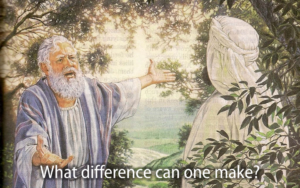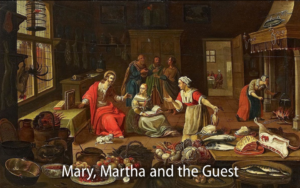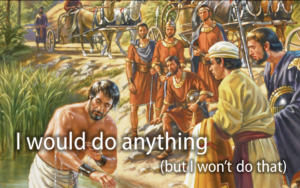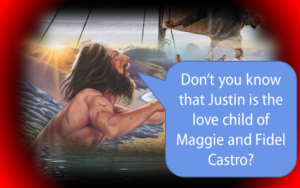Hespeler, 29 September, 2019 © Scott McAndless
Jeremiah 32:1-3a, 6-15, Psalm 91:1-6, 14-16, 1 Timothy 6:6-19, Luke 16:19-31
| O |
kay, let me see if I’ve got this straight. You, my little nephew, Hanamel, are coming to me with what you call an offer I can’t refuse. “Buy my field,” you say, “it’s a lovely little field at Anathoth. And it is just perfect, uncle,” you say. “The land is good, the birds sing in the bushes and the flowers bloom. It’ll be a wonderful place for you. Maybe you could even build a little house to retire in there. You’ll love it, so why not buy it?”
Hanamel, I thank you for your offer. It is so nice of you. And just think, you came all the way here to see me and make your offer. All the way here to the court of the guard where I am sitting in chains being watched day after day because the king has decided that I am public enemy number one because I dare to challenge him and say to him that maybe he is not so smart to take on the greatest army on the face of the earth.
But let’s not just talk about my present good fortunes. Let’s talk about that greatest army on the face of the earth that I mentioned a moment ago. Did you notice them on the way here, Hanamel, the armies of Nebuchadnezzar King of Babylon – the ones that totally surround the entire city? Yes, the ones with the great big swords and the chariots and archers who have locked up this entire city tighter than a drum. You’ve heard of them, I suppose? They’ve got a bit of a reputation for vanquishing enemies, laying waste to cities and perhaps, most of all, destroying nice little fields with good soil and bushes and tweeting birds in places like Anathoth!
So, you see all of that and you very kindly think of poor old me, your uncle Jeremiah, rotting away here in the court of the guard and you say, Good ole uncle Jeremiah, he would surely love to buy this lovely little field. Well, I’ve got to say that it’s a tempting offer. In fact, I’m quite sure that my financial advisors would tell me that this is just the kind of investment I need to be making at this particular moment in history. I mean, who wouldn’t want to put everything on the line when absolutely no one has any clue what the future might hold. Well, Hanamel, I guess I really only have one question for you at this point: where do I sign.
In my lifetime, I have seen a few ups and downs in the real estate market. I lived in the West Island of Montreal for a while, around the time of the second referendum. There were lots of English-speaking people who were suddenly very keen on finding employment elsewhere and that meant relocating and that meant selling houses. Everywhere you looked, there were “for sale” signs (or “à vendre” signs, because they had to be in French) and no one was buying. It was the perfect illustration of the fact that no one wants to make any significant investments when the future is uncertain. That’s about the closest time in my own personal experience to what Jeremiah was dealing with in our reading this morning but really a little bit of political uncertainty is almost nothing in comparison to a foreign invasion on top of the personal crisis of being thrown in prison by the king – now that’s uncertainty!
Now, I know that we are presently living in what is often called a very hot real estate market. Housing profits are high and only seem to go higher and yet people are still very eager to buy. You might think that we have nothing in common with the kind of situation that Jeremiah was dealing with. You might think, therefore, that this ancient passage of scripture has nothing to say to us today, but let us look beyond the mere question of real estate prices for a minute and I think we may discover that Jeremiah’s choice is actually one that we are all struggling with these days.
Today, more than ever, we are living in a time of uncertain futures. On some level, almost all of us are dealing with severe anxieties about the future. What will happen to the global economy? Sure, it has been on an unprecedented rise in recent years with employment soaring and huge amounts of money being made by some, but experts are pointing at worrying signs and everyone acknowledges that no economy can soar forever? What happens if the economy crashes hard? Uncertainty!
We live in times of great political uncertainty. I’m not saying that all of the governments in the past were always good and just, but they have been at least kind of predictable ever since World War II. Everyone at least had a sense of what the boundaries were and respected the often unspoken rules of reasonable government. But we now find ourselves in an era where rules and precedents are made to be broken. Who could have predicted the Brexit mess in the United Kingdom? Who could have imagined a situation in the United States where constitutional norms are challenged on a weekly, sometimes daily, basis? And as for Canada, I was told that our present federal election was going to be boring with nothing to talk about – what happened there? What strange government might result. Unpredictable seems to be the rule of the day in global politics.
And what about the environment? How are any of us supposed to plan for the future when we have huge numbers of scientists assuring us that, even if we make the enormous changes they are calling for, the earth itself may change beyond recognition in the coming decades. The promise of a climate catastrophe is likely the number one cause of insecurity about the future, especially among younger generations who are resisting having children and making major purchases (like property) because of it. Environmental unpredictability has become the most influential concern of our time.
So, we may not have the Babylonian army at our gates, but we are dealing with massive insecurity about the future in our times. I believe that Jeremiah’s actions do speak to us. And what do they say? They say that people of faith are people who make what seem to be foolish investments when the future is uncertain.
Now, I have often heard it said that Christians are people who believe in hope even when things seem hopeless and that is true and it is kind of what I am saying, but I am saying more than just that. When we speak of our hope in uncertain times, we generally only speak on an emotional level. We talk about how our faith comforts us and makes us feel better about our anxieties. And that is all good, we all need that, but I would notice that Jeremiah’s sense of hope goes far beyond just emotion. Jeremiah’s hope spurs him to action – foolish action, it seems, but decisive and meaningful action nonetheless.
I sometimes think that my job, as a preacher of the gospel, is to persuade people to be like Jeremiah. I get up, week after week, and I declare to you, folks, that I don’t know what the future is going to hold, that things may go seriously wrong with the economy, with the political system, that things will probably go seriously wrong in the environment and climate. In addition, I don’t really know what the future of the church is going to be. Some of the economic, demographic and societal pressures that the church in Canada is dealing with, experts will say, could well spell the demise of the church as we have known it.
I get up here, with all of that going on, and tell you, not merely that you should have hope for the future, but that you should invest in a future that I can’t quite show you. I ask you to put your time, your energy, your enthusiasm and, yes, your money on the line to build for a future that we can’t quite see. That is what it is to be a Christian preacher these days. That is what it is to be a Christian.
And why do I do that? Is it because I am a fool? It is because I think you are fools? People may have thought that of Jeremiah and may think it of people of faith today, but it was not true for him and it is not true of us either. Why do we invest when the future is uncertain? Not because it makes sense according to the logic of this world. We do it because we are willing to place our trust in God.
Can I stand here today and promise you that I know exactly what is going to happen to the economy or to property values? I cannot. But I can put my trust in the God who owns the earth and all that is in it, who owns the cattle on a thousand hills and claims all people as his own. I can tell you that the economy is in God’s hands and God promises to work for economic justice, sometimes in very unforeseen ways.
I cannot stand here today and tell you that I know who is going to win the federal election. For that matter, I wouldn’t even dare to say that I think I know who ought to win that election. Honestly, I can’t even say at this moment that I know who I’m going to vote for. Sometimes I do look at the political situation in our country and in others and throw up my hands and say that I don’t have a clue what is going on. But I will put in the work that I need to in order to know how I will vote, and I will participate and speak when I have the chance. I will invest in the political process but I will not do it because it always all makes sense to me. I will do it because I know one who is the King of all kings and the Lord of all lords and who has a reign that will endure for ever and ever.
I do not know what the future holds for the climate, but I am sure that the road ahead will not be easy. I’m not a climate scientist but I do take very seriously the warnings that climate scientists are sounding. I believe that radical change is needed and I will admit that I don’t have a lot of confidence in humanity or human leadership to make those changes. If anything, the climate crisis makes the human problem of sin – especially the sin of not being able to see beyond our own passions and passing desires – appear all the more clearly. I don’t know what the future of this planet looks like, but I do believe in the Creator, the one who laid the foundations of this earth and who has a plan for its future. (That is the promise of the Bible, by the way, not merely heaven but a new heaven and a new earth.) That is the only reason why I have hope for the future of this planet but, more importantly, it is what gives me the ability to invest in a future that I cannot imagine. That is why I can make the efforts to reduce my energy use and my waste. That is why I am bold to ask more from my leaders. Christians are people who make investments in a future that they do not see.
And I cannot stand here today and tell you what the future of this church or any church will hold. I see great forces of change at work – demographic, societal, technological and much more. I can promise you that things will change but I don’t really know how – nobody does. But I have decided and will continue to decide to invest my life, my time and energy and my money in a future of the church that I don’t yet see. Why? Because it makes sense according to the understandings of this world? Not really. I do it because I know that somebody loved the church, somebody who died for it and who gave everything for it. If Christ could give it all for the sake of the church, I can know that whatever I make, it is not a foolish investment.
I am your nephew, Hanamel, and I come to you today with an offer that you cannot refuse. I invite you to purchase a future – a future that you cannot see, but that is held in the hand of God. And honestly there is no better place for the future to be held than in those hands. What will you invest in that future?










